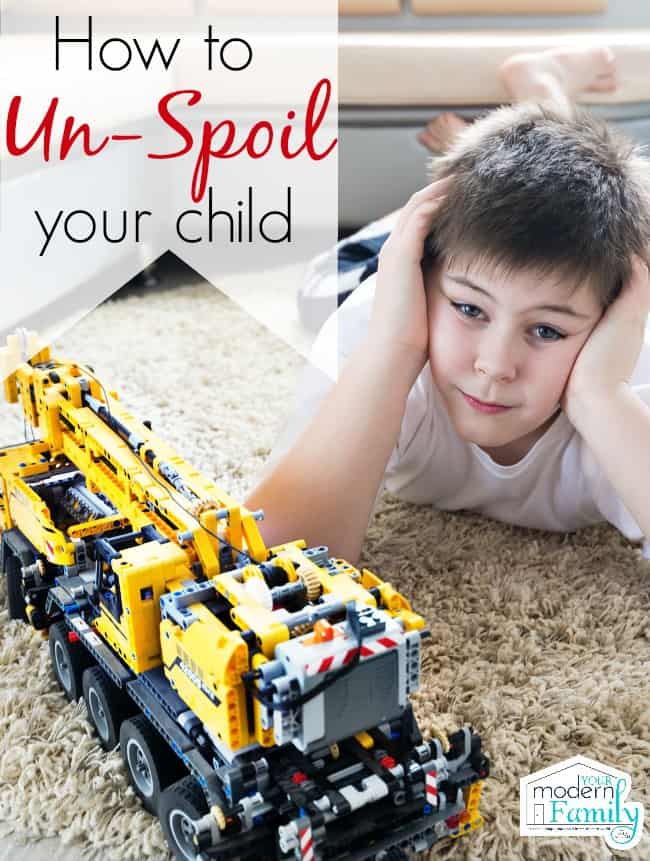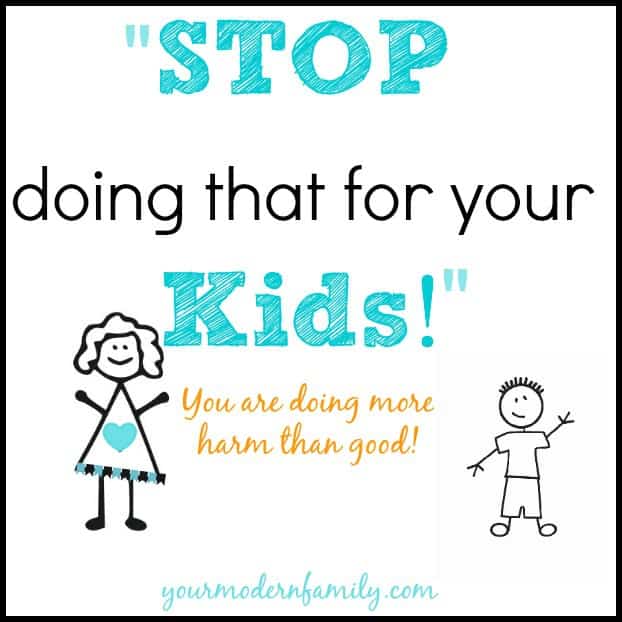This post may contain affiliate links. Please read our disclosure policy.
I want to talk to you about how you can get kids to stop arguing. This can happen now- within a week if you stick to it.
My husband and I found ourselves caught in this cycle of letting our son argue with us, more than once. Not a lot, but still… We aren’t “yellers” and we do not spank (we never will, so no need to leave comments about that. I did a lot of research in college and I just don’t see the benefit of it.)
I am a firm believer in talking to your children and that by listening to them, you will find a solution. However, there are times when this doesn’t work. Talking to them is ALWAYS the first thing that we try- we need to let them voice their opinions, just like we want to voice ours, if we want to raise our kids to be responsible adults.
Sometimes it just ins’t enough…
Our 8 year old has started ‘arguing’ with us. It started a few months ago and we have had it “up to here”. Let me give you an example:
J- “Mom, can I watch Minecraft on YouTube?
Me- “No, not right now. I need to be with you when you watch YouTube and I can’t right now.”
J- “I want to see how to build that ice cream shop on Minecraft.”
Me- “Not right now. I am helping your brother.”
J- “I just want to watch it for two minutes. Can’t you help him after?”
Me- “No, I can’t. I’ll be with you in a few minutes, when I’m done, but not if you keep asking.”
J- “Mom? Can’t I just watch it for 5 minutes? I promise that’s all.”
So- you see, this back & forth arguing is getting us NO WHERE. What is the solution? Its simple! My husband turned to me, one day, and said “We’re done. We are done arguing with him. From now on – what we say goes. There isn’t any debate or question about it. If it is something that we can talk about with them, we will. If it is something that we have already decided, than it is not up for discussion. We are the adults here.”
I was on board with it, 100%. Later, talking to my mom, she told me the same thing: When she was little, what her parents said was it. There was no arguing about it. It is just not respectful and I don’t want them to think that it was OK.
THERE IS A TIME AND PLACE FOR DISCUSSION, AND WHEN IT IS DONE PROPERLY, GREAT.
WHEN IT IS DONE AS A BACK AND FORTH ARGUMENT, after they have already heard the answer– IT IS NOT GOING TO WORK.
The worst part for us to come to terms with is that is it us, the parents, that are causing the arguments! You see, once you open up to argue your point, or “have the last word”, you are just inviting your child to accept your invitation to have an argument. Gone are your moments of “because I said so”.
So what do you do?
A friend/reader recently sent me this little snippet by John Rosemond (writer with the Charlotte Observer) that states: “That is how to stop arguments. You simply give the instruction in as few words as possible. “It is time for you to pick up your toys,” for example.
The child will then ask for an explanation. Don’t be fooled. In that context, “Why?” and “Why not?” are not requests for information. They are challenges to battle.
When you answer the child with anything other than “This is what we are doing right now and I need you to help. We are NOT going to discuss it.” you step straight into quicksand, and the harder you struggle, the further and faster you sink. It’s an example of parenting minimalism, defined by my online dictionary as “using a few very simple elements to achieve maximum effect.” Indeed.”
So honestly, the best way to stop an argument is to not allow your child to get you into an argument. You just have to tell yourself that you are not going to argue. What good comes from it? Really?
Today, instead of arguing, just stop. Give your child an ultimatum and stick to it.
Your child will learn from this that in the end, the choices that he/she makes are up to him. YOU ARE UNWAIVERING, so it is his/her decision what the outcome will be.
If you need more help, I suggest this book. It is great!




















One phrase I try to remember to use is “Asked and answered.” It avoids those circular arguments too.
Great tip!
Becky,
This is really smart and totally relevant to my life right now! Thank you! I’ve never said “Because I said so” to my son before, but I can see how something of that sort is an important concept for kids to get used to.
I really appreciate the tip!
Brittany
I know- we were the same way. 🙂
Every child is different… I think you have to set firm rules with expectations, and consequences but at the same time be willing to reach your child in a way they understand. My child has Aspberger’s and this technique would never work! Our black and white rules to him are color, and variations, and possibility…yet he has the same rules and expectations as my other children, the way I deliver the message is just tailored to the way he would understand. Another big thing– don’t let it slide or give your child another chance. Once you make a decision it has to be final. If you ease up on the rules, the kids will learn that what you say does not always mean what you do.
I catch myself saying “because I said so” all the time. It is definitely a bad habit of mine. My boys are still fairly young but I do believe in listening to what they have to say. Even if it does not seem important it is always important to them. A lot of arguments never get started because I take the time to hear what they have to say. Great post!
Thanks, Addi.
Totally agree! Most of the time I don’t feel like
Children are trying to debate or be rude, but genuinely want to know “why”. As an adult, I still want to know why or why not I have to do something.
I can see how this would work – however where is there then room for them to show us that they may have another (perhaps better?) Suggestion? I want my kids to feel like they are heard and they can contribute. ‘Because I said so’ just shuts the whole conversation down.
For example – ‘I’ve thought about what you’ve had to say, but we still need to go to the shops now and that won’t be changing, so go and get your shoes on please’. At least your acknowledging them then?
I’m not sure, I’m not am expert but just because it ‘works’ doesn’t always mean it’s the best idea.
Totally agree- I love the way that you put it, too.
That’s where the aboved mentioned “asked and answered” would work. You give the child one opportunity to ask and you answer simply, if they continue to try and argue and state their case a simple “asked and answered ” is all that is needed 🙂 a technique that was brought up in a parenting class I was in.
I like that idea.
We’ve implemented several ‘house rules’ as well that avoid arguments, especially between the kids. They ALWAYS used to argue about who would sit in which seat in the car. Now it’s ‘Dante in the back on the way there and Galen in the back on the way back” (we have 3 rows of seats, they don’t sit up front). Now they just get into the car with no debate. When kids know what’s expected of them, they get on with it. When they can see that there is room to manoeuvre, they push and push. Equally, when they can see that I’m not fully decided on something they push and push. It’s tough being decisive but once they see that the rules are there, they stop arguing. (The same as when you say “because I say so”.)
Yep!! 🙂 Love that you said this: When kids know what’s expected of them, they get on with it. (so true!)
Is this a common issue at this age? Our girls (twins) are 8 and our biggest problem right now is talking back to adults (us, grandma, great grandma, etc). Not so much the “why?” but more so trying to explain or justify their actions rather than taking responsibility for them. Any ideas on better ways to teach accountability?
Every one of my friends is dealing with this, too (with our 8 year olds). I think just sticking to what you say and being VERY consistent seems to work best.
I agree with you 100% and I try to raise my 3 kiddos with e ‘guidance’ approach and we do have a lot of discussions and chats, meditations and brainstorms because like you I believe chatting about our problems (and active listening to theirs) is the way forward. However, sometimes I do just want to say “because I said so” because there’s not always time to have a debate about it. My problem is that a) I’m a single mum and so leaving any of them at home on their own if they don’t want to come is not an option and b) I have a smart-ass son who would remind me that our way is to talk things through when we have a problem (I have said fairly often, “if you don’t want to do something please just use your words and explain why rather than ignore me”).
If I have to make them do something I have on occasion said “you have a choice here, you can either do this happily or you can do this grumpily, but we do have to do it”
I do that, too “We are going either way, so its up to you if you have fun or if you stay upset and don’t have a good time. Every day you get to decide what you make of your circumstances.”
Really needed this. My 6 year old has started talking back witha tinge of an attitude and also using language we don’t allow such as stupid and hate. I really want to nip this in a bud before it becomes standard behavior. Going to try it this week. Going to be tought but worth a short for his long term behavior. Thanks
Alison
Theguiltymommy.com
I’m having fun reading your comments!! 🙂 We were running out of patience, but it worked for us.
In another circumstance when the whole family is in danger of having to stay home, it is not fair for one difficult child to be allowed to make this decision for everyone else. Of course there are instances where this technique may work, but it is not the end all of arguments. To me, this is among the last resorts or a technique to use if I am in a state of mind when I just don’t have the patience to converse and discuss the situation.
Good points – I just want our kids to know that I have the final say- not them. THere is a time & place for discussions, but they need to know that I, as the parent, know what is best for our family.
This has been working fairly well but we still have issues getting out the door for school. Their stuff is usually prepped so that’s not an issue. They can’t not go. What do I do?
We had this issue with our oldest son when he had to leave for school. I just told him that I was taking him, crying, complaining or whatever… it didn’t matter. I even told him that I would take him in his PJ’s if I had to. The book is the BEST parenting book I’ve read–>> http://amzn.to/18gF1Bx Its really helpful!
Overall, I like this approach. We were having the back-talk problem with our 11 yr old. Eventually, when she started arguing, I just started saying “Has arguing or whining ever gotten you what you want before?” She knows the answer is no. It makes her mad, but she immediately sees how pointless arguing will be.
Agreed! Its updated. 🙂
This works when their young in age, try it with a teen you’ll be blown away in a heart beat.
Oh- lol! Yes- our kids are young (8 6, 4, 2)… I can’t imagine having teenagers just yet.
I used to teach 3rd and 4th grade at a school that had a lot of students with very challenging behavior. Once I had made up my mind and given a direction my only response after that would be (kindly but firmly) “you need to follow that direction”. At first some students would try to engage in a back and forth but if that is the only response it is hard to argue and they learn quickly to follow the direction. If I needed to repeat that phrase more than 2 times it was followed with “you need to follow that direction or …” And then give a logical consequence. There are definitely times when I would first answer their question, if it was a legitimate question and not arguing, and after answering that if they asked anything else I would start in with “you need to follow that direction”. It’s similar to the “asked and answered” reply someone else gave but is maybe just giving them a little more info on what they need to do. I use this at home with my children too and it has worked wonderfully.
Also, I think it’s good to sometimes model for them taking a moment to think. So if my child has a request that I’m on fence about I tell them I need to think about it. Then I try to stop what I’m doing and take a moment to think about the request before answering. That way they see that I take the request seriously, I model thinking about something before acting, and I make sure that my response is one I want to stick to.
I love the idea to tell them that you need to think about it, because they deserve that, too. Great tip!
Ps- I used to teach 2nd (K, 1st & 2nd). 🙂
Becky,
great post. I’m so glad to say I’ve been trying some of these for a while now. But read get it in your terms made be feel like I will have success in the end. My 3 year old is the biggest debater of. The planet. But I’ve been sticking to what I say, and probably annoying family along the way. My BIL is like it’s one toy. I’m like I told him to put it away cause we are leaving I have to stick to what I said.
Always love your blog.
Amanda
Thank you Amanda!! 🙂